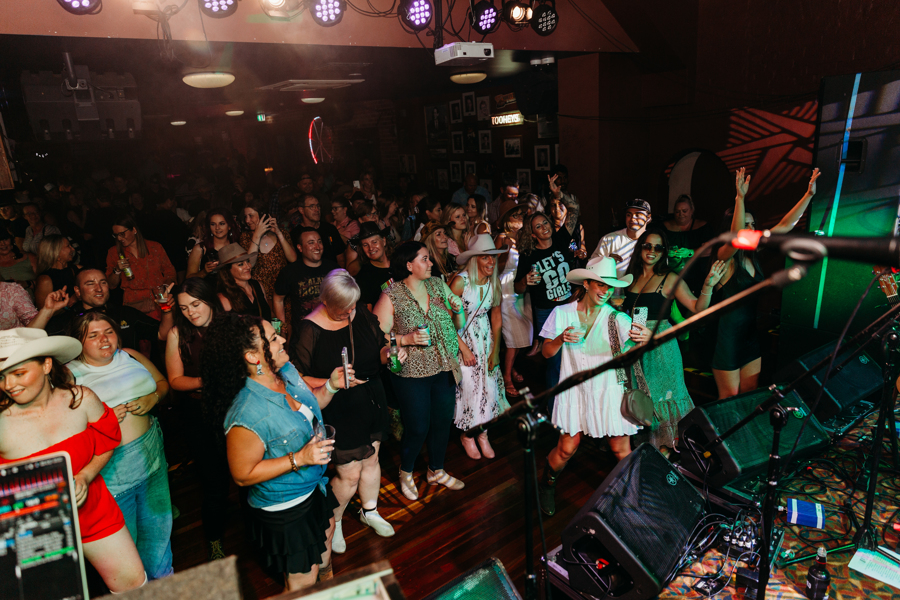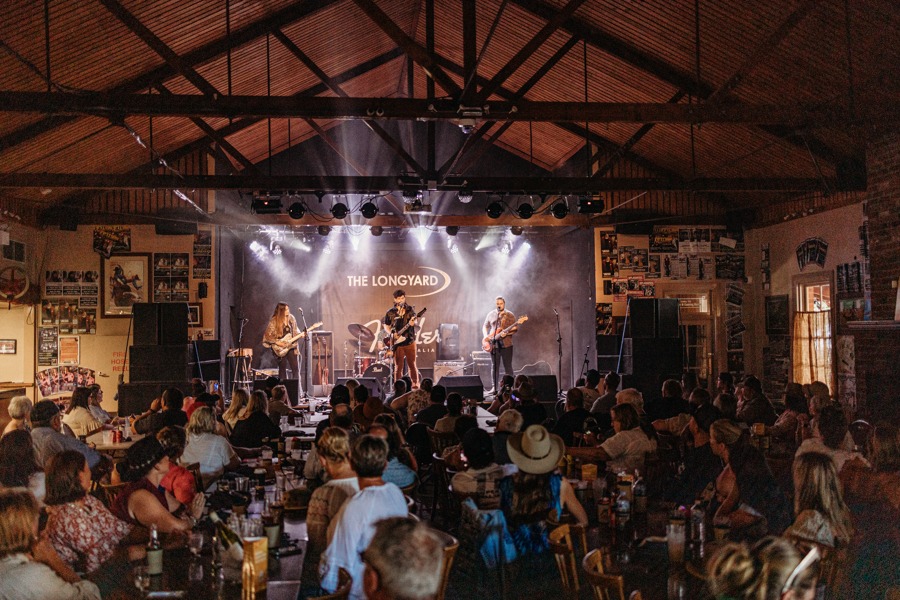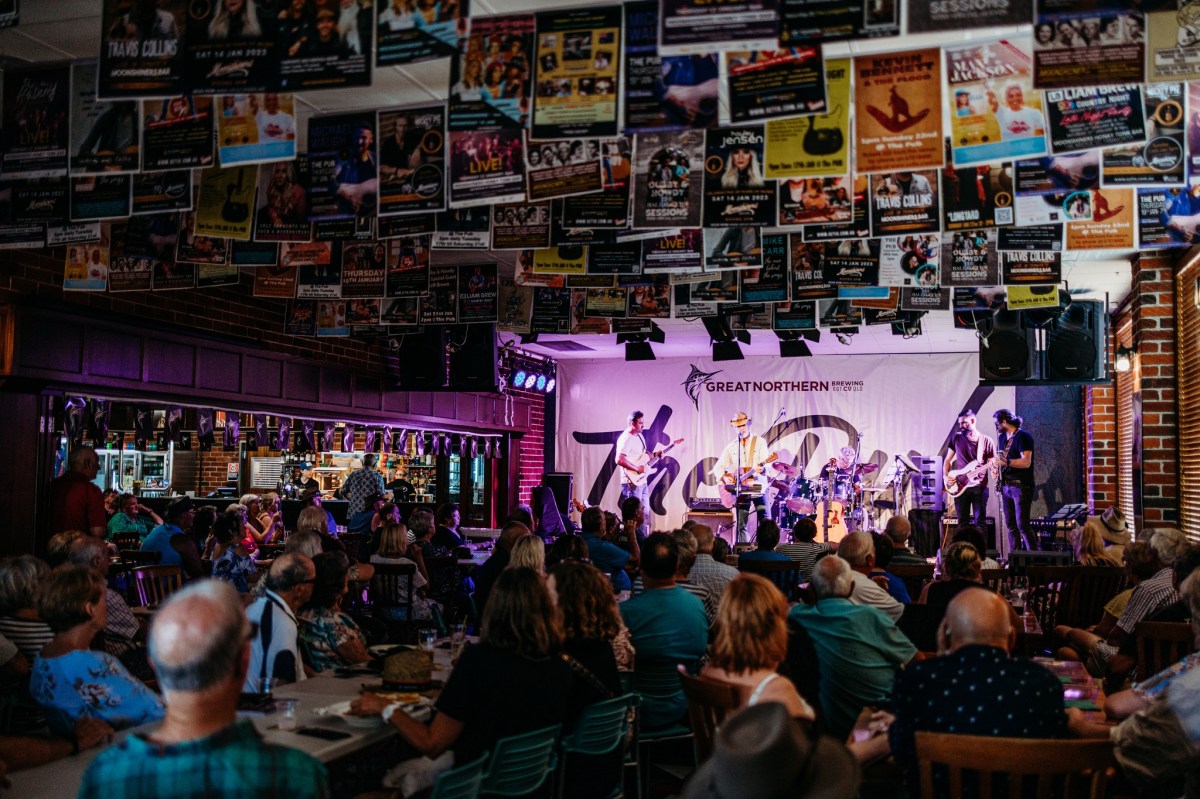In March this year, the Federal Government launched an inquiry into the challenges and opportunities within Australia’s live music industry, and the regional pub industry is backing an initiative to foster a more sustainable and economically vibrant live music scene.
In an challenging economy, grassroots venues are feeling the impact of rising costs, reduced consumer spending and changing tastes. While these challenges no doubt impact the success of such venues, reliance on alcohol sales poses another concern.
The Pub Group Tamworth operates several venues in regional NSW, including the Longyard Hotel, The Pub and Moonshiners Honky Tonk Bar, each home to a broad schedule of live music.
While alcohol sales hold great significance, Craig Power, managing director of The Pub Group Tamworth, expresses the importance of diversified revenue streams.
“Grassroots venues would find it much harder without additional income streams like food sales, accommodation, gaming, and wagering. With the cost of wages, electricity, and entertainment increasing considerably since Covid, the ability to increase the cost of alcoholic products to align with our rising costs is nearly impossible. It’s the other income streams that support these losses.
“We’ve been expanding our food offerings and creating family-friendly environments to attract a broader audience. This approach not only supports live music but also ensures sustainability for our venues,” he added.

Last year, the Torquay Hotel scooped the award for Best Live Music Venue at the AHA Vic Awards, and according to Luke Hindson, venue entertainment manager, live music continues to draw a crowd, and the diversified offering keeps patrons in the venue for longer.
Having a large beer garden, restaurant and accommodation on site makes the venue unique and creates additional revenue streams, despite live music often being the draw card.
“Live music at the Torquay Hotel has been strong but we seem to be an outlier in an industry where many are finding it tough. We work hard to attract acts who pull diverse audiences. We are also fortunate to have the support of our local community who love a night out,” stated Hindson.
“Torquay Hotel is a unique live music venue. The room is certainly not as pretty as The Forum or some of the city venues, however, we believe the band room has an unmatched energy. Fans can see some of their favourite artists live in an old school pub setting. Sometimes artists will sell thousands of tickets in Melbourne and make the time to play our small venue on their off night.
“Customers can arrive early and have a meal, enjoy the live music, stay for a catch up and dance in the beer garden if they would like to kick on, and even stay the night in our hotel,” he added.
Relying on the community
While revenue streams present a challenge for regional grassroots venues, the challenge also lies in the logistical hurdles of hosting regular events.
Despite being based in the country music capital of Australia, home to Tamworth Country Music Festival which attracts more than 100,000 visitors annually, Power says attendance remains a challenge for venues and performers.
“As live music and performance venue approvals have increased, we’ve seen more venues offering music. However, in a regional town with more than four venues having these approvals, the market becomes saturated. There’s simply not enough trade to go around, but to meet obligations, there’s a need to have live entertainment on,” he stated.
One of the ways in which the group is combatting these challenges is by building strong relationships with musicians and encouraging community engagement.
Renowned for their lively ambience and commitment to live music, The Family Hotel and Moonshiners Honky Tonk Bar featured as the backdrop in Australian musician Andrew Farriss’ latest music video, further enhancing their reputation in Tamworth’s live music scene.
In a statement about the project, Farriss said: “Filming Something Stronger at The Family Hotel and Moonshiners Honky Tonk Bar has been an incredible experience. The energy and history of these venues perfectly complement the spirit of the song. I’m thrilled to share this special connection with fans worldwide.”
Revitalising the touring circuit
The live music industry is critical to Australia’s cultural and economic ecosystem, and with grassroots venues playing a crucial role, the Australian Live Music Business Council (ALMBC) is responding to the Parliamentary inquiry with two recommendations to reinvigorate and sustain the future of smaller and more remote music venues.
Firstly, the ALMBC is advocating for a new funding model to mitigate the risks associated with national metro and regional touring, revitalising the touring circuit and encouraging artists to reach regional audiences and economies.
The proposed Australian Touring Artist Program (ATAP) would act as a financial safety net, providing comprehensive support and negotiated rates for travel, accommodation and professional services, reducing the overall cost for artists and ensuring they can perform across a range of venues with risk limitations in place.
Sharing his opinion on the ATAP, Power stated: “This recommendation could be transformative. By reducing the financial risks associated with touring, more artists would be willing to perform in regional areas, bringing high-quality live music to broader audiences.
“This model would help sustain both the artists and the venues, fostering a more dynamic and inclusive live music ecosystem. The largest challenge to success is enticing people to leave the comfort of their homes.”

At a time when people are spoiled for entertainment choices, creating unrivalled experiences would be imperative to the success of this program, Power outlines.
“New funding will assist in the marketing and ability to lure large artists into regional areas, but the communities must be engaged to come and enjoy the experience. It needs to be a better experience than what they can get from their own lounge room.”
Hindson added: “This appears to be a responsible way of ensuring artists who wish to tour can do so without coming home completely broke.
“The problem we see is there needs to be venues for the artists to perform in. Torquay Hotel band room has a 600 capacity, and our breakeven is over 300 tickets. We cannot take smaller scale shows. Our industry needs smaller satellite venues to build and develop artists.
“We know of four smaller capacity venues in our region that have closed just this year. It is not unrealistic to think that by the end of the year there will be no venues left for artists to tour,” he added.
Supporting the broader live music ecosystem
In alignment with the Federal Government’s National Cultural Policy, the second of the ALMBC’s recommendations is to introduce an arena ticket levy.
The ALMBC proposes a small levy on ticket sales for live music events held at large arenas, with funds to be distributed to grassroots venues as a means of dispersing economic gains across the broader live music ecosystem.
Inspired by similar successful models, such as the Music Venue Trust’s initiatives in the UK, the ALMBC proposes that the levy should be managed through a trust which is established specifically to support smaller, independent venues.
Having heard success stories from the UK, Hindson says an arena ticket levy could be promising, but it doesn’t address some of the wider issues faced by regional venues.
“We feel there are many facets of the live music industry that should be reviewed. Venues are under extreme pressure. For venues to survive we need competitive insurance rates, reduced licencing fees for small venues, and security requirements to be more flexible depending on nights of the week and style of act performing. This would be a start,” he stated.
Although Power would like to see more support for smaller, regional venues, he raises concerns about the viability of such a levy.
“Are [larger arena-type venues] truly making the perceived profit that the general public thinks? It has been the larger arena-type festivals this year that have been cancelled, not the smaller ones, as promoters struggle to make them work,” he stated.
While acknowledging the support this could provide grassroots venues, he believes it would be a shame to take away from the success of bigger venues who also work hard to achieve their results.
“Any business should not rely on the success of others to financially support their shortfalls. Dispersing funds from such events could provide financial support to grassroots venues, but it’s crucial to ensure the larger events are left no worse off; otherwise, their viability may be questioned.”
A resilient industry
While we are in a period of uncertainty, ALMBC chair Howard Adams says the live music industry is equipped to weather the storm, and its resilience will ensure that we don’t lose grassroots venues altogether.
“The notion that ‘the model is broken’ overlooks the critical role grassroots venues play in the development of major Australian artists,” stated Adams.
“Their survival benefits the entire industry, from promoters to artists, by ensuring a continuous pipeline of emerging talent and diverse musical expressions. If we all work together, I have every confidence that the music industry will get through this difficult period.”

